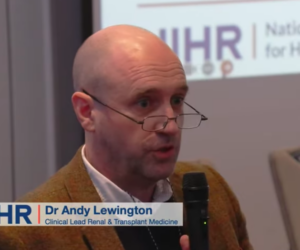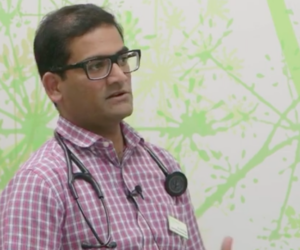Theme Leads: Dr Andrew Lewington and Dr Kerrie Davies
Background
Early diagnosis of complications from surgery will improve patient outcomes, minimising expensive remedial treatments and increasing quality of life and survival.
In the context of ambitious national targets (e.g., NHS Long Term plan) and the NHS workforce crisis, efforts are focused on identifying individuals or groups who are most at risk and most likely to benefit from additional tests/treatment. Research efforts should be focused on innovations that meet a clear unmet clinical need, target underserved groups, have the potential to be easily implemented within routine clinical practice, and are cost-effective.
Our work on early modelling, target product profiles, adaptive trial designs, and comparative technology evaluations provides an innovative methodology platform for improving the efficient evaluation and adoption of new technologies. We have enhanced our IVD expertise during the pandemic, notably working closely with NHSE, Test and Trace, UKHSA, MHRA and industry on the design and assessment of novel infection IVDs.
Areas of Focus
Sepsis: Clinical decision making is hampered by slow diagnostic methods, such as blood cultures. There is an NHS England drive to improve the blood culture pathway with rapid differentiation of bacterial from viral infection speeding up clinical decision making and timely antimicrobial susceptibility testing to guide appropriate therapy. Acute Kidney Injury (AKI) is a common sequalae of sepsis, affecting 50% – 70% of critically unwell patients and is associated with adverse outcomes, including long term chronic kidney disease and increased mortality. Early identification of patients at risk of progression to severe AKI or persistent AKI is critical and applying novel diagnostic assays and predictive models are key to improving outcomes.
Urinary tract infections (UTIs): tests available at the point of care (POC) to accurately diagnose UTIs are lacking, as are the rapid antimicrobial susceptibility tests (ASTs) to help guide appropriate antimicrobial therapy. Such tests currently take >18 hours with delays from collecting the sample and shipping to the laboratory, meaning that these laboratory-based tests often have little impact as empirical treatment has already been started. This delay can have long-term consequences. Accurate POC tests would speed up diagnosis of infection leading to more timely treatment with better preservation of kidney function. They would address the problem of AKI becoming one of the top five causes of premature death by 2040.
Kidney transplantation: there is a huge variation in access to kidney transplant surgery with respect to gender, age and ethnicity and this is partly due to lack of robust diagnostic tests for risk stratification and often overcautious approaches resulting in delay or denial to access. We will have a particular focus on tackling disparities in access to diagnosis and treatment, particularly in the community setting. Through our current community and patient and public involvement events, we are building relationships with them towards inclusive research activities.
Penicillin allergy status and its effect on antimicrobial prescribing, patient outcomes and antimicrobial resistance (ALABAMA: allergy antibiotics and microbial resistance)Renal function assessment with point of care creatinine in diverse populations (RAPID)
A comparison of remote blood collection devices: a human factor use study
AKI-Predict
Transforming how chronic kidney disease is diagnosed and treated
Point-of-care creatinine devices to assess kidney function before CT imaging with intravenous contrast
CT scans are commonly used in the NHS to diagnose various medical conditions. Contrast containing iodine is frequently injected into the patient’s blood stream to improve diagnostic accuracy. This is well tolerated with few side effects in most patients. However, patients who have reduced kidney function e.g., chronic kidney disease (CKD), are at risk of developing acute kidney injury (AKI) which is associated with poor outcomes. Therefore, all patients over the age of 50 years or with known CKD need to have their kidney function (serum creatinine blood test) checked before having a contrast-enhanced CT scan. This leads to possible delays and may lead to postponement of the CT scan with delayed diagnosis and treatment and lost appointments.
The NIHR Leeds IVD MIC worked with Mid Yorkshire Hospitals Trust to develop a potential solution to this problem, providing clinical and patient expertise, alongside statistical and health economic support. The team evaluated the feasibility of using a risk screening questionnaire (doi.org/10.1016/j.ejrad.2019.01.007) to determine which patients needed a blood test and the feasibility of point-of-care testing of creatinine in radiology. Further work evaluated the performance (doi.org/10.1515/cclm- 2018-0128) and cost-effectiveness (doi.org/10.1016/j.crad.2020.09.018) of 3 CE-marked point-of-care creatinine testing devices (Nova StatSensor, Abbott i-STAT and Radiometer ABL800 FLEX). The studies showed that a risk-informed, smarter, CT pathway – including “on-the-day” point-of-care creatinine testing – was both a feasible and cost-effective way of measuring kidney function for safe contrast-enhanced CT scans.
The NIHR Leeds IVD MIC approached NICE with the research findings, which were subsequently used to inform a NICE MedTech Innovation Briefing. It provided all of the data, including the economic model, which is heavily referenced throughout the evidence review that accompanied the NICE Diagnostics Guidance (DG37). The published national guidance recommends the use of point-of-care creatinine testing when current practice requires that kidney function is assessed before contrast- enhanced CT and the patient does not have a recent measure of kidney function. More recently, this research has received international recognition being cited in an American Association for Clinical Chemistry guidance document.
Early prediction of acute kidney injury for patient benefit
We developed a test using 22,843 patient records from the Leeds Teaching Hospitals NHS Trust to reliably predict the chance of patients developing acute kidney injury (AKI) within 1 – 7 days, based on routine blood tests taken as part of standard of NHS care. This data supported a successful application to the Kidney Research UK MedTech competition. We scaled up our work, using 470,000 patient records to improve test accuracy and predict AKI before it is identified by the current NHS AKI algorithm. The AKI-Predict AI system can predict the probability of developing AKI, and the distribution of times when it will occur, with unprecedented sensitivity and specificity. This data informed a subsequent successful Kidney Research UK project grant which started in April 2024.
Transforming diagnostics. Empowering labs. Strengthening public health across Africa. 🌍🔬
The team was brought together by Robyn Meurant of ACT-IVD, and led on one of the EXPANDIA project’s core work packages, focused on the development of a decision-support tool to help African reference laboratories select diagnostic testing modalities that are best suited to their clinical priorities, available infrastructure, and public health needs.
The EXPANDIA project is an international initiative led by the International Centre for Genetic Engineering and Biotechnology (ICGEB) to strengthen diagnostic and surveillance capabilities across sub-Saharan Africa.
Key deliverables included:
• A needs assessment and stakeholder engagement report
• A thematic evidence review and accompanying report
• An algorithm prototype developed through stakeholder feedback
• A comprehensive final report to support the adoption and scaling of context-appropriate diagnostics
Working with public health laboratories in countries including Cameroon, Senegal, Nigeria, Kenya, Ethiopia and Zimbabwe, the Leeds HRC team helped translate both local insights and global evidence into a usable, scalable tool for decision-making in diagnostics.
This work represents the value of international collaboration, technology transfer, and innovation tailored to real-world public health challenges.
The project team included Dr Kerrie Davies MBE (Co-theme lead), Dr Virginie Viprey, Dr Jane Freeman, Naomi Ajenifuja, Robyn Meurant, Professor Mike Messenger, Dr Margaret Głogowska, and Dr Philip Turner (who represented the team at the final stakeholder dialogue in Cameroon).
Huge thanks to the team’s partners:
ICGEB, ACT-IVD, Insightful Health Ltd, NIHR HealthTech Research Centre – Community Healthcare, University of Oxford, University of Leeds.
🔗 Learn more about the project at EXPANDIA: Introducing technologies empowering African labs – ICGEB
EXPANDIA: Expanding Access to Sustainable Diagnostics Africa – ICGEB
Speaker Presentation at BSHI 2024 – Mixed dynamic behaviour of individual DSAs following HLA-incompatible kidney transplantation is associated with worse outcomes
Speaker Presentation at BSHI 2024 – Optimising Post-Transplant DSA Monitoring: Identifying Key Time Points for Predicting DSA Dynamics following HLAi kidney transplantation
Equality, Inclusion and Diversity Programme
A major challenge has been initiating and sustaining PPIEP relationships with underserved communities. We developed a strategy to successfully engage:
- PPIEP members reflective of the patient characteristics of the disease under study. For example, for giant cell arteritis, which women aged >70 years; for multiple myeloma, black African men aged >60 years.
- Known underserved communities who do not typically engage in medical research
We worked with charities and patient groups with existing, extensive PPIEP groups to recruit PPIEP members for specific projects. We worked with community leaders to develop suitable recruitment strategies and develop community-specific and culturally appropriate information. We also established a series of regional community events, and created a template for knowledge mobilisation between researchers and PPIEP contributors.
Coming soon…..



